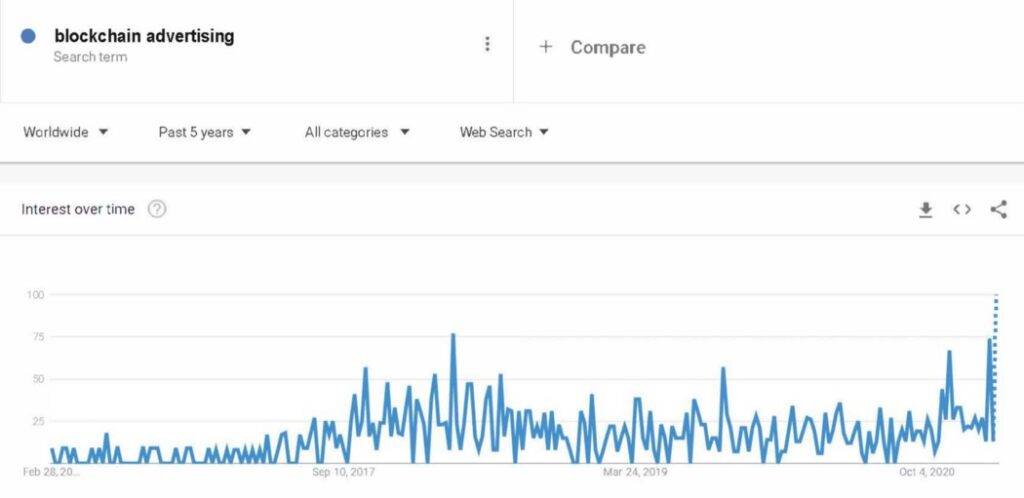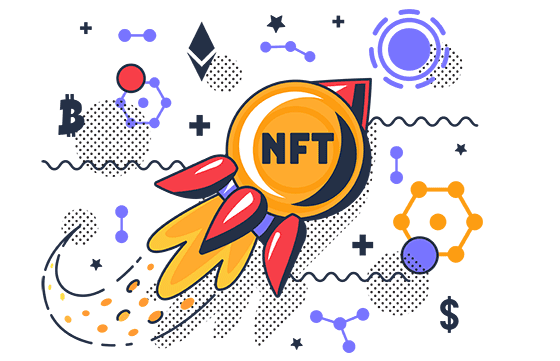Link to part 3
Every day we read about data breaches caused by digital ad vendors. We’re being watched constantly with secret cookies that we unconsciously permit. According to Juniper research, advertisement losses were estimated to reach $42 billion in 2020 and are expected to reach $100 billion by 2023. Blockchain has taken steps to ensure accountability when serving advertisements and paying for actual human interactions on ads, not robots.
This article will explore how Blockchain will impact the digital marketing supply chain in the near future. But before we dive in, let’s look at the numbers.
Blockchain adoption statistics
- The blockchain market is projected to hit over $23.3 billion by 2023 and $176 billion by 2025.
- Digital advertising is predicted to grow to $427.26 billion by 2022.
- Blockchain advertisement interest is on the rise according to Google trends.

Why is blockchain technology entering digital marketing?
The marketing/advertising industry space has recently opened up for Blockchain when data inflation and discrepancy news emerged online — marketers and publishers have begun to search for a safer alternative to transparency.
Ad outlets such as Facebook Ads, Google Ads, and others have enjoyed digital advertising supremacy in the last decade. These advertising giants manipulated data and knowledge to make a massive profit margin.
Advertisers had enough and sued several social networks for overstating ad metrics and video views, leading to extra costs for inflated and tapered data. Blockchain technology will end such practices since information corruption is impossible due to its decentralized nature. Campaign managers will never have to engage with ad outlets to collect campaign data, nor will they need ad vendor background checks or references. All necessary vendor information is validated and presented upfront, eliminating the risk of misrepresentation and trust-building activities.
Revolutionary applications of blockchain technology in digital marketing
1. Ad Buying and selling without mediators: Intermediary won’t benefit from the use of blockchain-powered digital marketing platforms. Blockchain addresses the ad tech industry’s accountability and trust problems, creating an environment where trust is not an issue.
2. Fraud detection and accountability in the supply chain: It’s tough to locate the fraudulent impressions and clicks you’re paying for. Blockchain technology can be integrated into traditional tools to help identify and flag sites with click fraud and bot infiltration eliminating non-human engagement.
3. Laser-targeting the right audience: Structuring an ad campaign based on buyers’ journey is critical. With the support of Blockchain, ad tech platforms can automate campaigns based on a set of rules. If the audience falls under those parameters, an ad would be available to them, enabling marketers to allocate resources with laser-target precision.
Audience participation can now be credible with very detailed data to help plan better campaigns. Leads and subscriptions will be authentic and identifiable.
4. Data control: Data and observations play a crucial role in creating campaign strategies. Blockchain makes it easy to retrieve the correct KPIs enabling better decision making.
5. Customize advertisement delivery: Seeing the same ad several times creates ad fatigue leading to brand fatigue. Marketers were unable to monitor the distribution of ads on most of the top advertising channels. With Blockchain, advertisers will be granted the power to reduce ad frequency according to their campaign objectives.
6. Ads on social media: Fake news published on social media networks can be monitored as blockchain technology is a distributed framework that is fully transparent and traceable. It can diminish or perhaps eradicate social media ad fraud.
7. Data security: Data privacy and security are a big concern for the digital marketing industry. The user’s online behavior is no longer the reason why you deliver your advertisements to them. Now, public permission is required to use their personal data. Many countries are taking steps to stop unethical activities. Security enforcement, such as GDPR, CCPA, HIPAA, and much more, came into the data privacy and security picture and were drafted with certain blockchain principles as context.
8. Ad-validation: Blockchain reduces or eliminates the need for third-party platforms to verify and validate ad guidelines compliance.
9. Advertisement automation: Ad automation processes are more straightforward and streamlined, making ads more relevant and effective.
10. Content management: Content delivery is more data-driven and reliable with Blockchain. Content monetization, content customization, content discovery, and content creation will be simpler on ad-platforms powered by blockchain technologies.
Digital advertising platforms that use Blockchain
Today, the market is filled with blockchain-powered ad platforms. Tech giants such as IBM Corporation, Amazon Web Services, Inc., Accenture Plc, Microsoft Corporation, SAP SE, Oracle Corporation, Infosys Limited are investing heavily in the technology.
Big corporations including Kellogg, Kimberly-Clark, Pfizer, Unilever McDonald’s, Nestlé, and Virgin Media have entered a recent blockchain pilot to improve online ad transparency. Automotive giant Toyota uses blockchain technology to eliminate fraud in their digital advertising campaigns.
Kat Howcroft, Senior Media and Chief Budget Officer at McDonald’s, says:
“Blockchain gives us the ability to see a completely clear picture of our investment through the digital supply chain. We are also eager to understand the possible effect it might have on our ROI and production.”
According to Bab Rangaiah, Global Marketing Director at IBM iX:
“Blockchain is creating new ways of conducting business across industries, especially where greater trust and transparency are needed. Regarding media, we expect Blockchain to provide every given media purchase with a single source of truth, removing the doubts and uncertainties that are normal today.”
Blockchain benefits in the digital marketing industry
Transparency and accountability are required across the globe in the digital marketing ecosystem. Blockchain ad vendors can provide a holistic and actionable view of transactions and ad distribution.
Data is the key to defining digital marketing activities’ performance. Blockchain enables the gathering of high-quality data without any threat to its integrity.
Transaction costs are significantly decreased by eliminating various payment gateway platforms. Blockchain-powered ad platforms ensure secured transactions while preserving user anonymity.
Blockchain is the future of the digital marketing industry. Get used to it!
It is too early to say if this will end all digital marketing controversies, ad fraud, and bot traffic. Yet, undoubtedly, Blockchain has a positive and incremental impact on the digital marketing ecosystem. Ad tech giants like Google are adapting blockchain-powered tools to boost their functionality. Businesses across all industries should follow suit not just to prosper but to survive.
Blockchain was at the top of the list in digital marketing trends in 2020. The time has come for zero tolerance to fraud, data alteration, and data breaches. Companies implementing Blockchain to their advertisement platform will lead the way forward. Now it’s your turn to add your business to the list or might be left behind.
Get in touch with me on LinkedIn and follow me on Medium.















